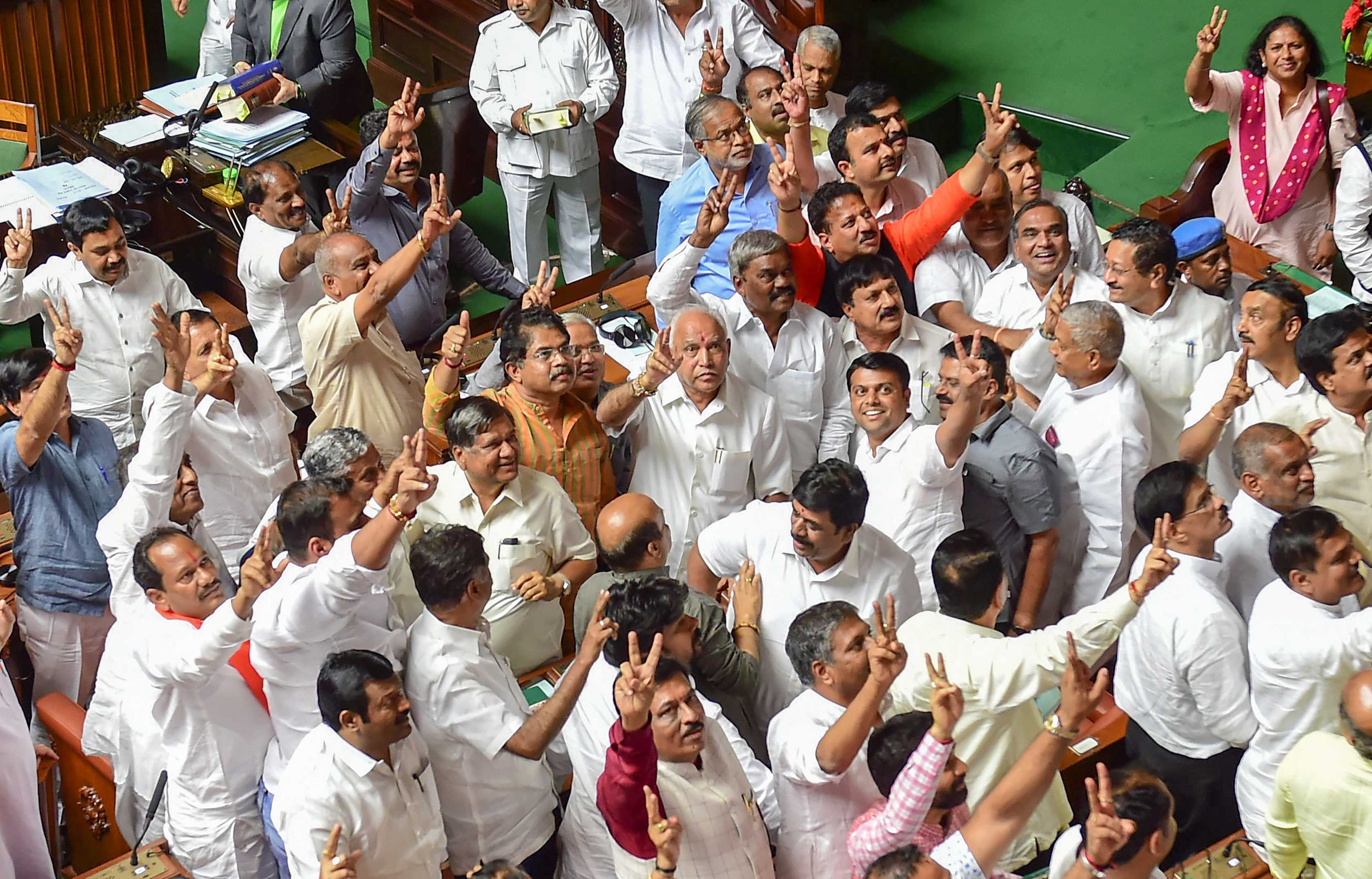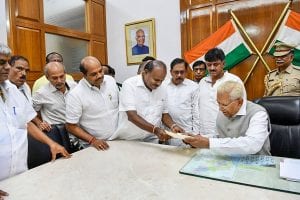
Karnataka stalemate ends, coalition govt falls by 6 votes
Bringing the curtains down on the political drama which started on July 1, Karnataka Chief Minister HD Kumaraswamy lost the trust vote on Tuesday.

Bringing the curtains down on the political drama which started on July 1, Karnataka Chief Minister HD Kumaraswamy lost the trust vote on Tuesday (July 23).
The ruling coalition managed to garner 99 votes against the opposition Bharatiya Janata Party’s 105. In the 224-member assembly, 20 legislators (15 resigned, two independent and two Congress absent, and one Bahujan Samaj Party MLA) abstained from voting.
The Chief Minister moved the confidence motion on July 18 after 15 MLAs resigned from the Assembly earlier this month. In his farewell speech, Kumaraswamy clarified on a host of issues including his stay in a private hotel and the lack of reach of farm loan waiver.


Before the commencement of the trust vote in the Assembly, Bengaluru city police issued prohibitory orders for 48 hours, starting 6 pm on July 23, after Congress and BJP supporters clashed outside a private apartment in Seshadripuram, where two independent MLAs — R Shankar and H Nagesh — were supposedly staying.
The ruling government continued its debate for the fourth day over the issues of horse-trading, Governor’s interference into legislative proceedings and on the Supreme Court curtailing the powers of a political party on issuing whip to rebel MLAs.
Also Read: It’s worse than just Kar’nataka’; politics as farce
All the parties involved had moved the Supreme Court with different petitions, following which, the top court had ruled that the rebel MLAs couldn’t be forced to attend Assembly sessions. However, Assembly Speaker KR Ramesh Kumar had on Monday upheld the Congress-Janata Dal (Secular) coalition’s whip issued to the rebel MLAs and warned them that they would be disqualified if they failed to attend the session during trust vote.
Besides, the Governor’s intervention into legislative proceedings and issuing deadline to the Chief Minister to conclude his trust vote, after meeting a BJP delegation, led to a furore in the House.
Meanwhile, BSP supremo Mayawati sacked the party’s lone MLA N Mahesh for abstaining from voting. Earlier, she had directed him to vote in the favour of the ruling coalition.

Fighting over the crumbs, the Congress-JD(S) coalition government that came to power with wafer thin margin in 2018, was supposed to be a model for the Mahagathbandhan (grand alliance) across the country.
In the 2018 Assembly election, the Congress received 38.14 per cent votes, BJP 36.34 per cent and JD(S) 18.3. The BJP was the single largest party in the Assembly but lacked majority in the House. It had more seats than the Congress but lesser vote share.
When State BJP chief BS Yeddyurappa staked claim to form government, the Governor had provided him 15 days to prove his majority. But the apex court struck down the order and asked him to prove his majority within 24 hours. But, Yeddyurappa resigned as the chief minister before the trust vote and the Congress-JD(S) combine went on to form the government in the state.
Also Read: The rise of BL Santhosh: From ‘pracharak’ to BJP’s trump card in South
During its 14-month tenure, the coalition government remained on shaky grounds as the rebel MLAs kept pushing the government to meet their demands.
From seat-sharing for Lok Sabha election to the allocation of ministerial berths in the state Assembly, petty squabbles over power and a tug-of-war between the two ruling parties gave the BJP an opportunity to engineer defection. The BJP has been insisting that the coalition government would fall post the general elections, in which it swept 26 of the 28 Parliamentary seats in the state.
BJP leaders including Yeddyurappa, Union Minister DV Sadananda Gowda have time and again reiterated that they would not prefer a fresh election.
Last week, JD(S) MLA Srinivas Gowda from Kolar alleged that three BJP leaders had offered him money to switch sides. “BJP leaders like Ashwathnarayan, CP Yogeshwara and SR Vishwanath came to my house and offered me ₹5 crore to switch sides. I refused to accept, but they left behind ₹5 crore. Later, they offered Rs 30 crore,” Gowda said.
He further claimed that the money offered to him was just an advance and that the leaders promised him more after he joined the saffron party.
Another JD(S) minister, Sa Ra Mahesh, alleged that former JD(S) State president H Vishwanath had an election-related loan of ₹28 crore, which the BJP had offered to pay off if he switched sides. Vishwanath is one among the 15 MLAs who had quit the Assembly and moved the Supreme Court against the ruling government. Besides, the ruling government also submitted photo proofs of BJP members accompanying the rebels in Mumbai.
Even as the ruling coalition demanded a probe into the horse-trading allegations, BJP maintained a stoic silence on the issue. Except denying its involvement, even the central leadership remained mum on the party’s role in the MLAs’ resignations. The BJP MLAs did not even participate in the Assembly debates and discussions for the last four-days.

